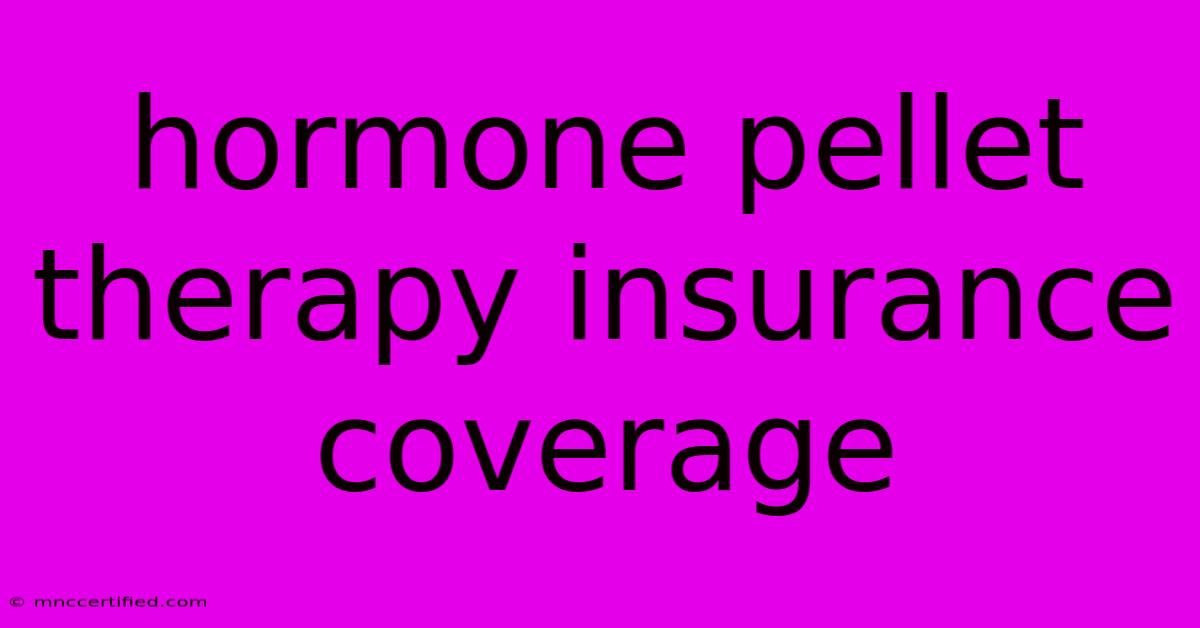Hormone Pellet Therapy Insurance Coverage

Table of Contents
Hormone Pellet Therapy: Insurance Coverage Explained
Hormone pellet therapy has gained popularity as a treatment option for various hormonal imbalances, including menopause symptoms, low testosterone, and thyroid issues. While many find it beneficial, a common question arises: Does insurance cover hormone pellet therapy?
The answer is not straightforward. Insurance coverage for hormone pellet therapy varies significantly depending on factors such as:
- Your insurance plan: Different insurance providers have varying policies regarding hormone pellet therapy.
- Your medical condition: The reason for needing hormone pellet therapy plays a significant role. Coverage might be more likely for specific conditions like menopause or low testosterone related to medical conditions.
- State regulations: Certain states have specific laws regarding insurance coverage for hormone pellet therapy.
Here's a breakdown of key points to consider:
Does Medicare Cover Hormone Pellet Therapy?
Medicare generally does not cover hormone pellet therapy. This is because it's often considered an off-label use, meaning the therapy is not approved by the FDA for the specific medical condition it's being used to treat.
However, there are exceptions:
- If you have a diagnosis of hypogonadism, Medicare may cover testosterone pellets.
- Medicare Advantage plans may offer different coverage options, so it's essential to check with your specific plan.
Private Insurance Coverage for Hormone Pellet Therapy
Private insurance plans often have more flexible coverage compared to Medicare. However, coverage is not guaranteed.
Here's what you should do:
- Contact your insurance provider directly: Inquire about your specific plan's coverage for hormone pellet therapy.
- Ask for pre-authorization: Even if your plan seems to cover the therapy, it's crucial to get pre-authorization before the treatment. This ensures you're not responsible for unexpected costs.
- Request documentation: Ask your doctor to provide detailed medical documentation outlining the medical necessity of hormone pellet therapy.
- Explore alternative treatment options: If your insurance doesn't cover hormone pellet therapy, consider exploring other options like oral medications or topical creams.
Finding Affordable Hormone Pellet Therapy Options
If insurance doesn't cover your treatment, consider:
- Negotiating with your doctor: Discuss potential payment plans or discounts.
- Exploring financing options: Look into medical financing companies or healthcare credit cards.
- Searching for providers with a sliding scale: Some clinics may offer discounted services based on income.
Navigating insurance coverage for hormone pellet therapy can be complex. It's crucial to research your plan, talk to your doctor, and understand your options. By taking proactive steps, you can increase your chances of accessing this treatment while managing its costs effectively.
Remember: This information is for educational purposes only and does not constitute medical advice. Consult with your doctor to make informed decisions about your healthcare.

Thank you for visiting our website wich cover about Hormone Pellet Therapy Insurance Coverage. We hope the information provided has been useful to you. Feel free to contact us if you have any questions or need further assistance. See you next time and dont miss to bookmark.
Featured Posts
-
Shetland S9 E1 Watch On Bbc One November 6
Nov 07, 2024
-
How To Get Botox Covered By Insurance Tmj
Nov 07, 2024
-
Katy Perry First Uk Headline Show In Six Years
Nov 07, 2024
-
2024 Washington Lieutenant Governor Election Live Updates
Nov 07, 2024
-
Prop 36 Passes California Criminal Justice Reform
Nov 07, 2024